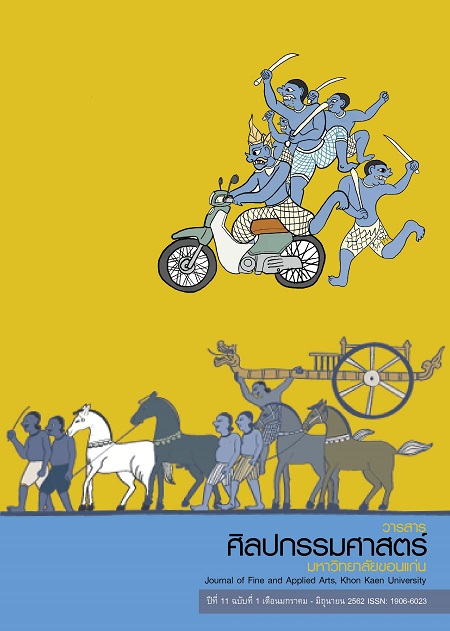The Traditional Music Learning Process of Folk Brass Band Provided to Young Musicians: A Case Study of Folk Brass Band Students Studying In Chongphranwitthaya School, Photharam District, Ratchaburi Province
Main Article Content
Abstract
This research paper was a qualitative research which aimed to study the traditional music learning process; including learning step, knowledge transfer, and evaluation of folk brass band provided to young musician students who join the folk brass band and studying in Chongphranwitthaya school in Photharam district, Ratchaburi province. The scope of study focused on 3 folk brass bands in Chongphranwitthaya school, using interview and non-participant observation to collect data. The findings of the study showed that the traditional music learning process was separated into 7 steps: 1) selecting young musicians to join the folk brass band by testing their basic ability in music 2) assigning to studying through listening to the songs before appointment 3) making rehearsal schedule for appointment 4) getting acquainted 5) repeatedly studying music notations coupled with music 6) memorizing music notes of the folk brass band and 7) repeatedly practicing with the folk brass band and the experts. The communicants taught the young musicians themself and used the teaching techniques as Thai traditional music style, also evaluated them by observed and tested the young musicians in every step of learning process without any formal evaluation tests.
Article Details
Content and information in articles published in the Journal of Fine and Applied Arts of Khon Kaen University is regarded as the opinion and sole responsibility of the author(s) directly; therefore, editors are not obliged to agree to or share any responsibility with regard to the content and information that appears within these articles.
All articles, information, content, image, etc. that have been published in the Journal of Fine and Applied Arts of Khon Kaen University is the copyright of the Journal of Fine and Appllied Arts of Khon Kaen University. Any person or organization who wishes to distribute all or parts of the articles for further dissemination or other usage must first receive permission from the Journal of Fine and Applied Arts of Khon Kaen University before proceeding to do so.
References
กิ่งกาญจน์ สิรสุคนธ์. (2545). รูบริคส์การให้คะแนน. กรุงเทพฯ : สำนักวิชาการและมาตรฐานการศึกษา.
ณรุทธ์ สุทธจิตต์. (2540). กิจกรรมดนตรีสำหรับครู. กรุงเทพฯ: สำนักพิมพ์จุฬาลงกรณ์มหาวิทยาลัย.
ทิศนา แขมมณี. (2522). ศาสตร์การสอน. กรุงเทพฯ: โรงพิมพ์จุฬาลงกรณ์มหาวิทยาลัย.
นวรัตน์ รัตนศรีวอ. (2550). กระบวนการเรียนรู้และการถ่ายทอดภูมิปัญญาเพลงเพื้นบ้านหมอลำ : กรณีศึกษาฉวีวรรณ ดำเนิน. วิทยานิพนธ์ ปริญญาครุศาสตรมหาบัณฑิต สาขาหลักสูตรและการสอน. นครราชสีมา : มหาวิทยาลัยราชภัฏนครราชสีมา.
นิพนธ์ กล่ำกล่อมจิตร. (2557). การศึกษาวิธีการถ่ายทอดดนตรีไทยในระบบโรงเรียนและบ้านดนตรีไทย. วิทยานิพนธ์ ครุศาสตรมหาบัณฑิต สาขาดนตรีศึกษา. กรุงเทพฯ : จุฬาลงกรณ์มหาวิทยาลัย.
ประเวศ วะสี. (2552). ทิศทางใหม่ประเทศไทย ทิศทางใหม่ของการศึกษาชุมชนท้องถิ่น. กรุงเทพฯ: สสส.
มนตรี ตราโมท. (2537). โสมส่องแสง: ชีวิตดนตรีไทยของมนตรี ตราโมท. กรุงเทพฯ: เรือนแก้วการพิมพ์.
มนตรี ตราโมท. (2540). ดุริยางคศาสตร์ไทย . พิมพ์ครั้งที่ 2, กรุงเทพมหานคร: บริษัท มติชนจำกัด.
วิจารณ์ พานิช. (2555). วิถีสร้างการเรียนรู้เพื่อศิษย์ในศตวรรษที่ 21. กรุงเทพ: มูลนิธิสดศรีสฤษดิ์วงศ์.
หทัยรัตน์ ทรัพย์เจริญ. (2553). กระบวนการถ่ายทอดการปฏิบัติกลองยาวของนายสิงโต เอี่ยมเคลือบ ครูดนตรีพื้นบ้าน หมู่บ้านโคกขาม จังหวัดสมุทรสาคร. วิทยานิพนธ์ปริญญาศิลปศาสตร์มหาบัณฑิต สาขาวิชาดนตรี, นครปฐม: มหาวิทยาลัยมหิดล.
สมบัติ เวชกามา. (2557). การพัฒนารูปแบบการบรรเลงดนตรีแตรวงชาวบ้านร่วมสมัยในจังหวัดอุตรดิตถ์. วารสารศรีนครินทรวิโรฒวิจัยและพัฒนา(สาขามนุษยศาสตร์และสังคมศาสตร์), 3(5): 130-132.
สุกรี เจริญสุข. (2541). แตรและแตรวงของชาวสยาม. กรุงเทพฯ: Dr.Sax.
สุพันธ์ ตันศรีวงษ์. (2538). วิธีการสอน. กรุงเทพฯ: สกายบุกส์.


